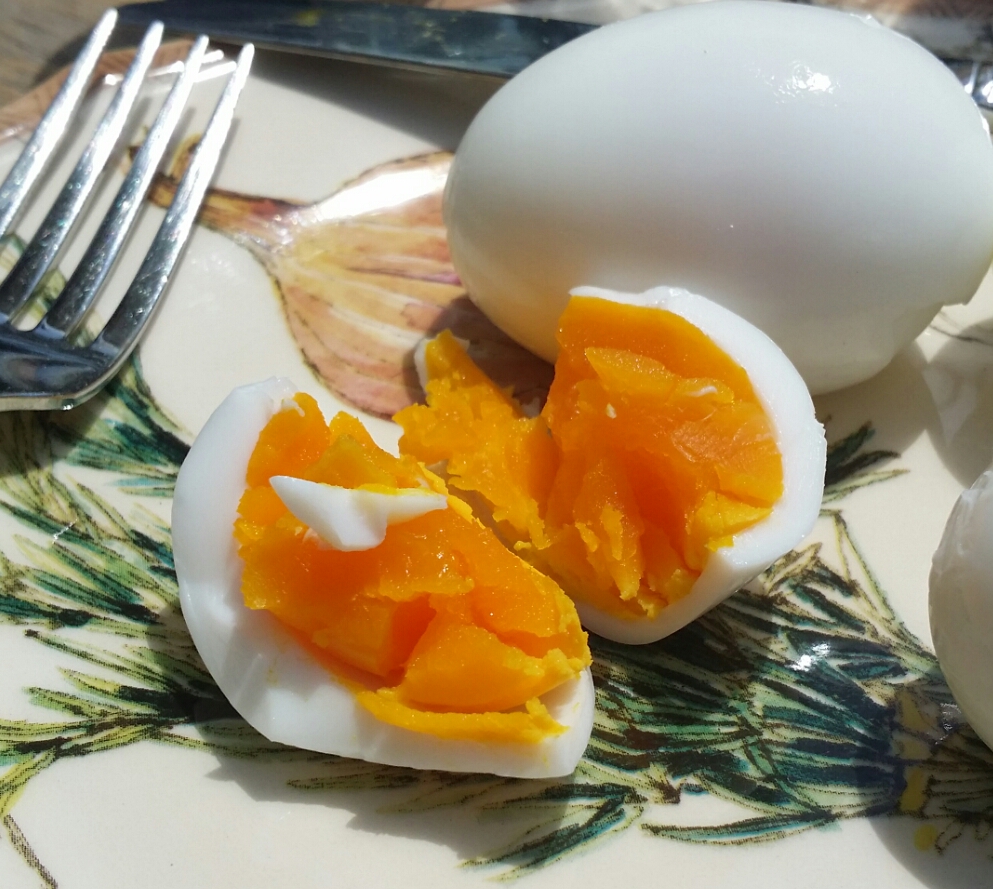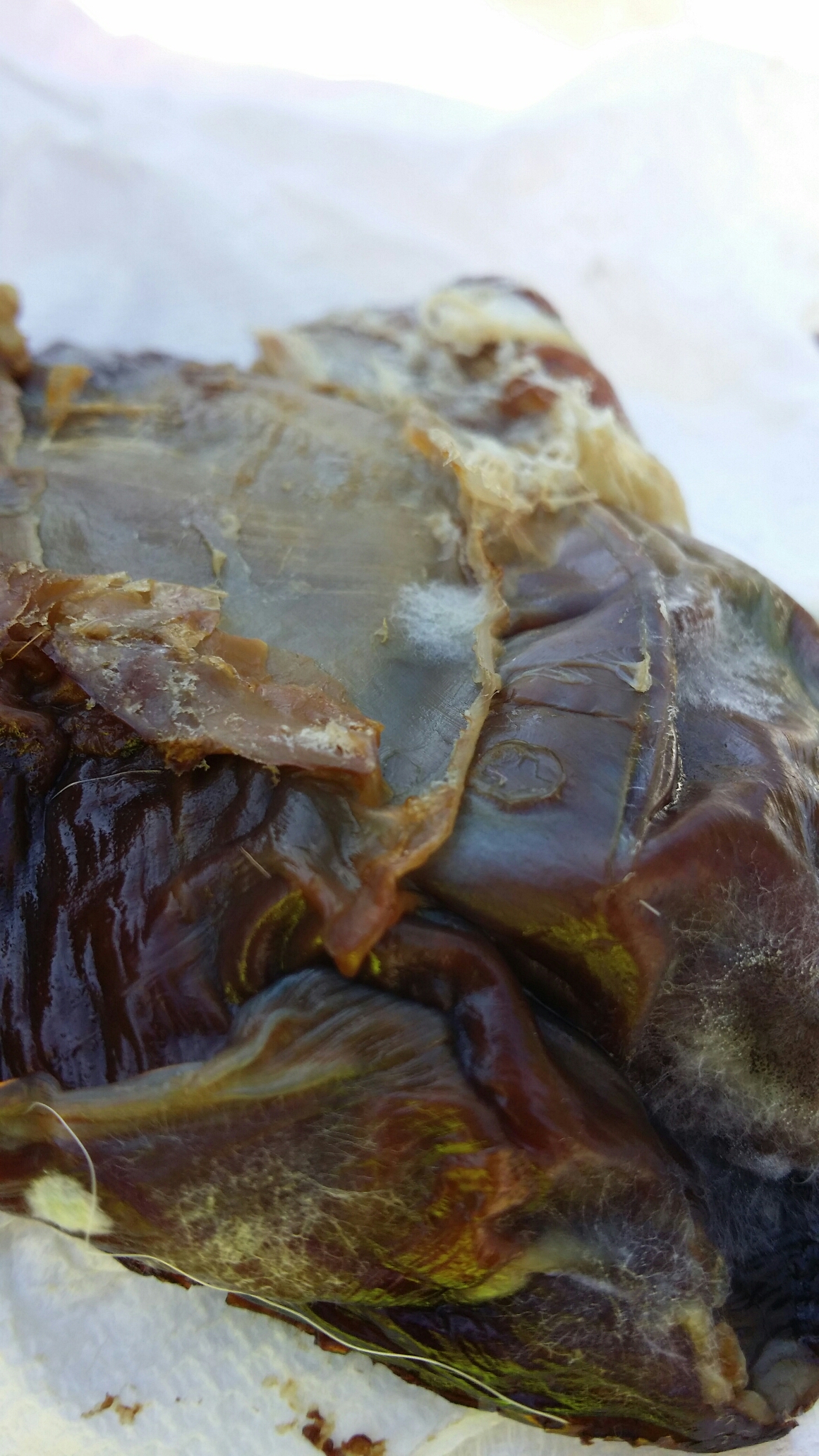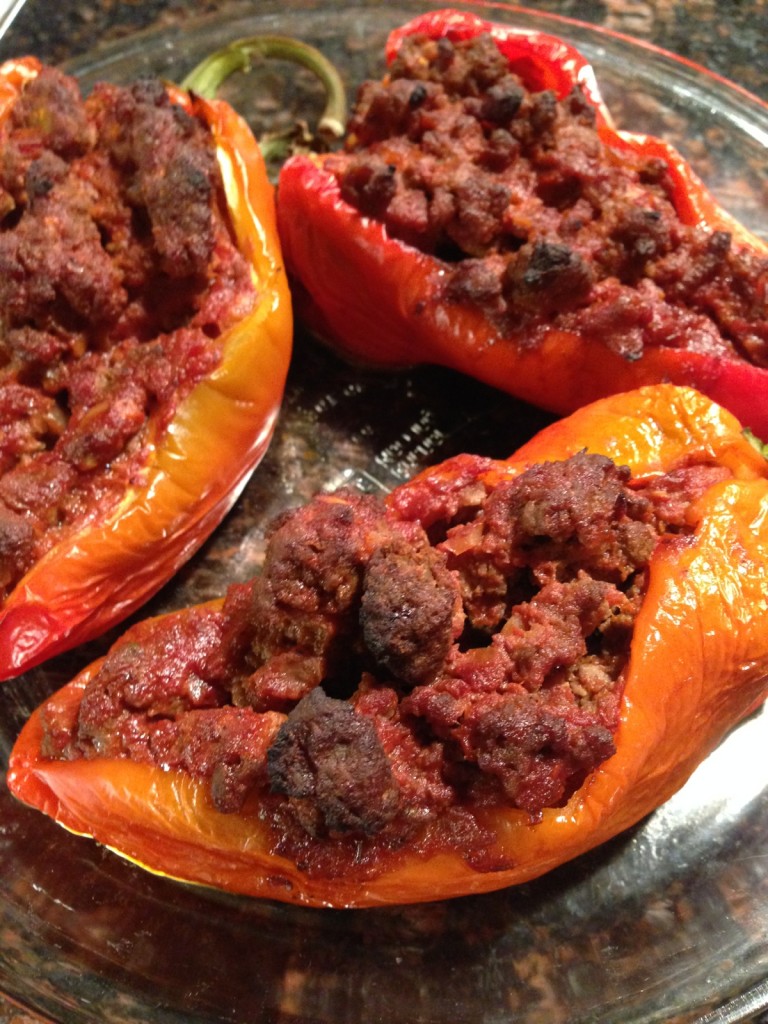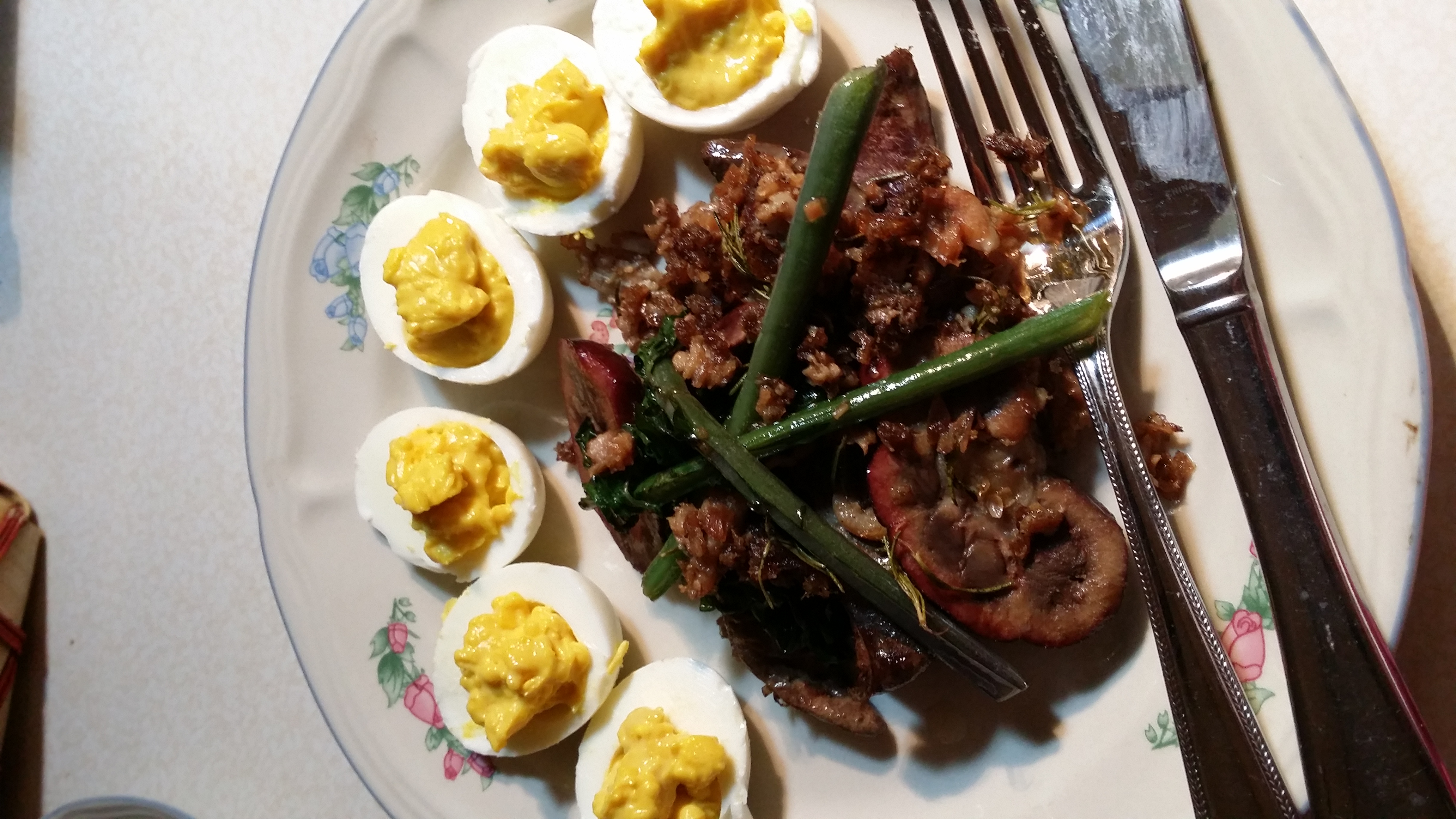Yummy, partially soft boiled eggs! It’s important to note that the longer the yolk cooks the more it oxidizes.
Category Archives: What Is Paleo?
Paleo simplified
Paleo Supper Club
The next Paleo Supper Club will be at Rosie’s residence again on the 28th of September. We’ll plan to meet around 5:00 and eat around 6:00. I look forward to seeing everybody again and seeing the smorgasbord of food!
If you need any recipe ideas here’s a good place to start: http://www.health-bent.com/recipes-index
Rosie is making a smoked Boston Butt! Feel free to commit and let us know what you plan to bring!
Deer Jerky
Need a grab and go snack? Try purchasing a dehydrator and making some venison or beef jerky the night before!
You can find dehydrators on amazon here: http://www.amazon.com/s/ref=nb_sb_noss?url=search-alias%3Daps&field-keywords=dehydrators
Rosie’s Garden Roasted Stuffed Peppers
Breakfast of Champions
To Salt or Not To Salt?
Today there is a lot of controversy over whether or not we should be salting our foods, and, if so, what type of salt should we be using. For every article I find that says we should be adding sea salt to our foods, I can find another one that says we should avoid salting anything.
I personally have decided to go with Dr. Cordain’s recommendation on the salt issue. He believes we should not salt our foods as salt consumption promotes high blood pressure, osteoporosis, and kidney stones, as well as insomnia, motion sickness, and asthma.
His articles can be found at the following website:
Cheap Chicken, At What Cost?
We had another great time at our Paleo Supper Club. The topic of how most of the meat in this country is raised came up and yes, it is disgusting, so to see the topic on Dr. Mercola’s website yesterday morning was timely. He talks about how chicken has become the cheapest, yet dirtiest meat we can eat. That is, if you eat chicken bought in the grocery store. The Animal Welfare Guidelines allow a stocking density that permits a chicken to be raised on an area equal to the size of an 8.5 x 11 sheet of paper. Most of these birds never see the light of day, and they can cram 30,000 or more chickens into a space that is 490 feet by 45 feet. These animals are sick, and fed antibiotics as a result. The chickens are also fed grain that has genetically engineered corn and soybeans in it. In addition, chicken feathers and other animal byproducts are added to the feed, which further increases the likelihood of disease in these animals. Surprisingly, it is not permitted to feed hormones to chickens raised in America.
Because chickens can be raised so “efficiently” in these confined animal feeding operations (CAFOs), chicken has become the least expensive meat to buy and consumption has risen dramatically in the past few years. The bottom line is that these animals become contaminated with antibiotic resistant bacteria, which can be transferred to us. In addition, the nutrient profile of the meat and eggs is nothing like that of chickens raised outside, eating the diet they were meant to eat.
Take a look at Dr. Mercola’s article, he goes into all the hidden costs of raising cheap chickens, including the ethical, environmental, and human health costs. There is a link to the video called Food, Inc. in his article which is also enlightening. http://articles.mercola.com/sites/articles/archive/2014/07/23/cheap-factory-farmed-chicken.aspx
Your best option is to buy from local farmers who raise their animals in a socially responsible way. This produces high quality food. True free range chicken and eggs come from chickens that are allowed to roam freely outside and eat their natural diet of plants, seeds, insects, and worms. The labels “free range” and “natural” are also tainted, so when you see this in the grocery store, it means nothing. There are loopholes that allow the meat and eggs that come from these poultry CAFOs to be labeled “free range” and “natural”. The frightening truth is that these conditions also apply to our beef, pork, and dairy food supply.
I follow a paleo lifestyle strictly for the most part, but we enjoy going out to eat with friends occasionally. The attitude that I have taken is that I will stick to a paleo diet as closely as possible when eating out, even though I know that the vegetables are not always organic, nor is the meat necessarily grass fed or local. This mindset becomes harder to justify as we learn more about how most of the food is produced in this country and it makes me want to only frequent establishments that buy from local farmers.
While I was at the farmer’s market last Saturday, buying food for the coming week one of the farmers asked me if I owned a restaurant, or if all these veggies were to cook at home. I told her that we cook and eat most of our meals at home. Our rule is that if we go out and spend money on a nice meal, it has to be at LEAST as good as what we can make at home, if not BETTER! I’m thinking this should hold true for the nutritional value of the food as well as the taste.
Weight Loss on the Paleo Diet
The original paleo diet book that Loren Cordain first published was not intended as a weight loss diet plan. It was intended to alleviate certain modern illnesses that plague our generation. Although most people will certainly lose weight if they cut out processed foods and simple carbs, there might be a few habits that are sabotaging your goal weight.
For starters, try not to eat standing up or in front of the television. Chew your food slowly and allow your stomach and brain to register what you’re eating. It is extremely important to enjoy your food so that this way of eating becomes a culinary adventure, not a dietary prison. These might seem like insignificant practices, but they are very important in establishing balance, avoiding overconsumption, and enjoying your meals.
Paleo Supper Club
Thanks everyone for coming to our Paleo Supper Club. We went from 14 people last time to 17 people this time. Woo hoo! We’re growing!
I hope to see everyone at our next gathering! Rosie and I were thinking about doing it at the same location again next time. If you have any thoughts or ideas, feel free to share!
We Do Have A Choice!
As a family, we’ve been following a paleo lifestyle for about a year and a half. We have come a long way in our understanding of exactly what constitutes a healthy lifestyle. Thanks to Erin (our own personal family nutrition expert), I feel like I have a pretty good handle on all of this. The other day I was ordering eggs from one of our local farmers and the phrase “sustainable farming” popped out at me. I thought about that for a minute and actually wasn’t sure that I really understood what that meant. So, I did what we all do when we want to know more about something….I Googled it! Sustainable agriculture is using methods of farming that protect the health and well being of humans, is humane to farm animals, is safe for the environment, and provides fair treatment to workers. If you eat ” sustainably,” you eat food grown by farmers that follow these principles. We have access to this kind of food through our local farmers who farm following these principles.
Our paleo lifestyle has completely changed the way we shop for food. Almost everything we buy comes from the local farmer’s market. We go in with a list of how many vegetables and meats we need to make meals for the coming week, instead of a set list of what we want. It’s very open ended in that we see what’s in season and what’s available that particular week. This ensures a variety of tastes and nutrients in our diet, and that will change seasonally. When a particular item like kohlrabi is in season we enjoy it, and when it’s gone we find something new to enjoy. The meat from the local farms is grass fed, so it’s high in omega 3 fatty acids and does not contain antibiotics or hormones. The animals are raised and butchered humanely. The vegetables from the market are free of pesticides and GEOs. We have gotten to know the farmers and look forward to seeing them each week. Since the market is only open at certain times, you begin to see the same people shopping at the market and you get to know them. At the farmer’s market you talk to the people that grow the food, ask questions about how it’s grown, what they will be bringing in the coming weeks, and they even share ideas on how they prepare some of their things. Most of the people there are very passionate about improving the way we eat and they are concerned for the environment.
Because the food industy in this country is a multi-billion dollar a year industry, at this point we have little control over what agribusiness chooses to do. We can take an active role in our health and that of our families. While we may not be able to change food labeling laws, or the practices of the major food industries in this country, we can choose how we spend our money. We can choose to buy locally and in doing so, know what we are buying. By supporting our local farmers we can ensure that we will always have a choice. I guess you could call this a modern day form of hunting and gathering. We have provided a list of local farmer’s markets for your convenience so proceed to hunt and gather!






